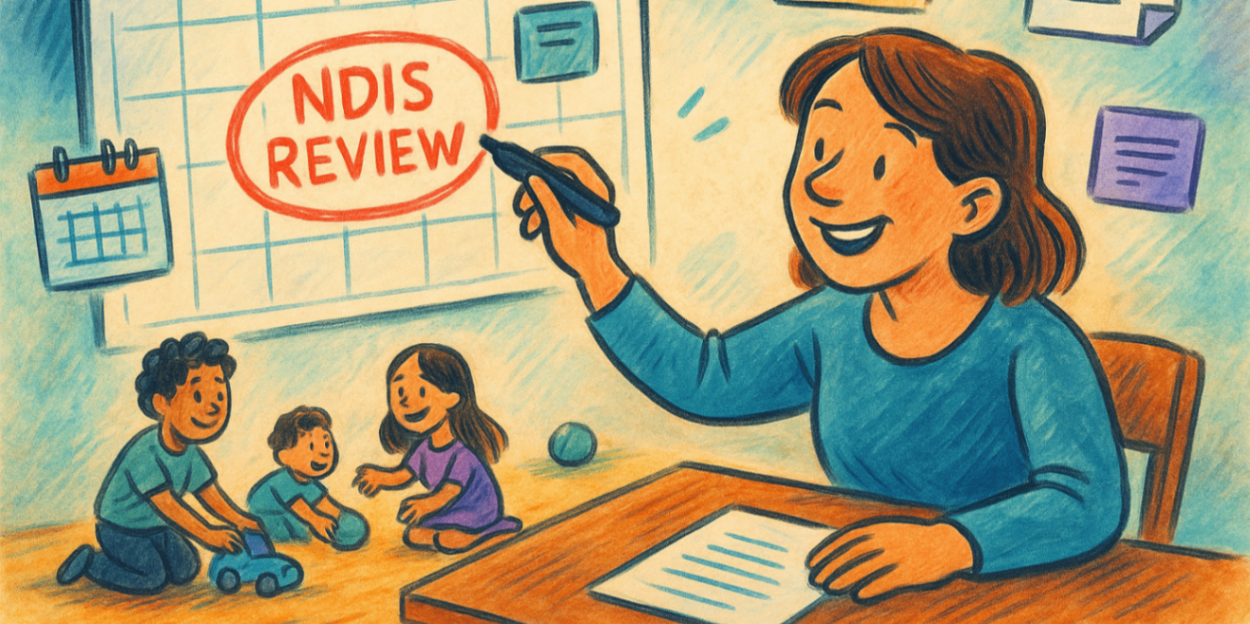
how plan management helps families stay on top of ndis reviews
11 September, 2025
Navigating the National Disability Insurance Scheme (NDIS) can feel complex, especially when it comes to plan reviews. For families, these reviews are more than just a checkpoint; they are a vital component of your overall family finances. Understanding how to stay on top of NDIS reviews is key to ensuring your loved one receives consistent, effective support. This guide explores how plan management can be a powerful ally, simplifying the process and contributing to your family’s long-term financial stability and successful financial planning.
Key Highlights
-
Effectively managing your NDIS plan is a crucial part of your family's financial planning.
-
Regular NDIS reviews ensure that the plan continues to meet your child's evolving needs and goals.
-
Plan management simplifies the review process by handling administrative tasks like paying invoices and tracking funds.
-
Using a plan manager provides access to expert support and tools, like an online portal, for real-time budget tracking.
-
This support helps families achieve financial stability and peace of mind, knowing their NDIS financial resources are well-managed.
Why NDIS Reviews Matter for Families
 NDIS plan reviews are essential check-ins that ensure your plan's funding and supports accurately reflect your family’s needs. As your child grows and their goals change, their support requirements will evolve, too. A review is an opportunity to adjust the plan, ensuring the allocated financial resources are optimized for their well-being and development. This process is a cornerstone of your family's financial security, as it directly impacts the funding available for necessary services.
NDIS plan reviews are essential check-ins that ensure your plan's funding and supports accurately reflect your family’s needs. As your child grows and their goals change, their support requirements will evolve, too. A review is an opportunity to adjust the plan, ensuring the allocated financial resources are optimized for their well-being and development. This process is a cornerstone of your family's financial security, as it directly impacts the funding available for necessary services.
For young families, prioritizing a comprehensive financial plan and understanding the benefits of financial planning is critical. A well-prepared review helps secure the supports that enable your child to thrive, preventing potential gaps in service that could place a strain on your family. It’s about being proactive to safeguard your child’s progress and maintain stability within your household. Properly managing these reviews helps you build a secure foundation for the future.
Why Staying on Top of NDIS Reviews Matters for Families
Staying on top of your NDIS reviews is about more than just compliance; it's about taking control of your family's future. When you proactively manage the review cycle, you ensure that funding continues without interruption, allowing your family members to pursue their goals consistently. This proactive stance is a key part of your financial planning.
It helps you align the NDIS plan with your long-term financial goals, ensuring that this vital resource is always working effectively for you. A plan manager can be an invaluable partner in this process, providing the tools and expertise to help you keep track of your budget and prepare for what's next.
Now, let's explore the specifics of regular reviews and the common hurdles parents encounter.
The Importance of Regular Plan Reviews
Think of your NDIS plan review like a regular check-up for your family financial plan. It is a designated time to assess what’s working, what isn’t, and what needs to change. Circumstances evolve, and a plan that was perfect a year ago might not fully meet your child’s current needs. Regular reviews allow for a proactive approach to managing these changes.
This process ensures that your family’s financial resources and financial resources are allocated effectively, supporting new goals or therapies as they arise. How can families start creating a financial plan together in this context? It begins with open conversations about your child's aspirations and needs, which then inform the goals you present at your NDIS review.
By treating the review as a fundamental part of your planning cycle, you can give your child a head start by making informed adjustments that help them progress. It transforms the review from a bureaucratic task into a powerful tool for shaping a better future.
Common Challenges Parents Face in Plan Reviews
While essential, NDIS plan reviews can present several challenges for parents. The administrative side alone can feel overwhelming, adding stress to already busy family lives. Many parents find it difficult to navigate the complexities of the NDIS system and articulate their needs effectively.
This process can become a significant financial burden if not managed correctly, potentially leading to funding gaps or misallocated resources. Good family pressures can sometimes strain family relationships, as the weight of managing the financial decisions falls heavily on one or two people. Common hurdles include:
-
The time required to gather reports and evidence.
-
Difficulty understanding which supports fall under specific NDIS budget categories.
-
The stress of preparing for the review meeting amid other family duties.
-
Worrying about unexpected events that may require plan adjustments.
How Plan Management Simplifies the Review Process
 This is where plan management makes a significant difference. A plan manager acts as an independent expert who lifts the administrative weight off your shoulders. They provide a comprehensive strategy to manage your NDIS funds, from paying provider invoices to tracking every dollar spent. This simplification is key to a stress-free review process.
This is where plan management makes a significant difference. A plan manager acts as an independent expert who lifts the administrative weight off your shoulders. They provide a comprehensive strategy to manage your NDIS funds, from paying provider invoices to tracking every dollar spent. This simplification is key to a stress-free review process.
By handling the financial complexities, plan management frees you to focus on your child's goals and well-being, including managing childcare expenses. Their support contributes directly to your family's future stability by ensuring your NDIS financial plan is transparent, organized, and ready for review at any time.
Let's look at the specific tools plan managers use and how they streamline payments.
Tools and Resources Used by Plan Managers
To help you stay in control, plan managers utilize specific tools and resources designed for effective money management. One of the most useful tools for families is a dedicated online portal. This gives you 24/7 access to your NDIS budget, allowing you to see your spending in real time. It provides complete transparency over your funds.
Another key resource is the experienced staff. These professionals are like financial planners for your NDIS funds, offering expert knowledge of the system. They can answer questions, provide guidance on your budget, and ensure everything is compliant with NDIS rules. This combination of technology and expertise empowers you to make informed decisions.
Here is a breakdown of what plan managers offer:
|
Tool/Resource |
How It Helps Families |
|---|---|
|
Online Portal |
Provides 24/7 access to track budgets and view statements for total transparency. |
|
Experienced Staff |
Offer expert NDIS knowledge to answer questions and guide you on using your funds. |
|
Fast Invoice Payments |
Ensures your service providers are paid promptly, maintaining good relationships. |
|
Monthly Statements |
Give you a regular summary of your spending, helping with future budget planning. |
Simplifying Claims and Payments for Families
One of the most significant benefits of plan management is the simplification of claims and payments. Instead of you having to process every invoice from your service providers, your plan manager handles it all. They receive the invoices, check them for compliance, and make payments directly from your NDIS funds, typically within a few days.
This service removes a major administrative task from your plate, freeing up your time and energy. It helps you keep track of your budget by ensuring all payments are accurately recorded and visible in your online portal. You no longer have to worry about chasing invoices or making manual claims.
This streamlined approach to managing your family finances related to the NDIS ensures that your providers are paid on time, fostering positive relationships and ensuring continuity of care. It’s a core element of financial planning that provides peace of mind.
Staying on Top of Your NDIS Budget With a Plan Manager

A plan manager is your partner in maintaining control over your NDIS budget. With their support, staying on top of your family budget for NDIS services becomes straightforward. Through tools like an online portal and monthly statements, you always have a clear picture of how your funds are being used. This real-time access allows you to track spending against your financial goals and make adjustments as needed.
This level of transparency is crucial for effective financial planning. You can see which support categories have available funds and make informed decisions about scheduling therapies or purchasing equipment. A plan manager helps you maximize your plan without the risk of overspending. They provide the structure and oversight needed to use your NDIS funds confidently and effectively, ensuring every dollar is put to good use.
Preparing for Your Next Review: Parent Checklist
A successful NDIS review starts with good preparation. Working with your plan manager can make this process much smoother. Before your meeting, it’s helpful to review your plan’s progress and think about future needs. This preparation is a practical part of your financial planning, similar to how one might approach estate planning by considering long-term needs for all family members.
Here is a simple checklist to help you prepare:
-
Review Your Budget: Use your plan manager's portal to see how you've used your funds with careful planning.
-
Assess Goals: Think about what your child has achieved and what new goals you want to set.
-
Gather Reports: Collect progress reports from therapists and other service providers.
-
Document Needs: Make a list of any new supports, therapies, or equipment needed for the upcoming year.
-
Consult Your Plan Manager: Ask for a summary of spending to support your requests in the review meeting.
Conclusion
In summary, effective plan management is essential for families navigating the complexities of NDIS reviews. By staying organized and proactive, you can ensure that your family's needs are met and that you make the most of available resources. Regular plan reviews not only help in managing budgets but also empower families to adapt to changing circumstances. Utilizing the right tools and support from plan managers simplifies the entire process, making it less daunting. Remember, a well-prepared family is a confident family.
If you're ready to streamline your NDIS experience and gain peace of mind, book a consultation with us.
Frequently Asked Questions
How often should families review their NDIS plans?
Families should review their NDIS plans at least once a year or whenever a significant life change occurs, such as the birth of a child. Regular reviews are essential for maintaining your family’s financial plan, including their health insurance, and overall financial health, as they ensure your family financial plan aligns with your child's current needs and that your comprehensive plan remains effective for your family finances.
Can blended families benefit from NDIS plan management?
Absolutely. For blended families, plan management can ease potential complexities in financial planning by providing a neutral third party to manage funds. This can reduce stress on family relationships and help everyone align on the clear financial goals for adult children’s education, ensuring the focus remains on support and not on administrative burdens.
What support do plan managers provide during the review process?
Plan managers provide crucial support by offering detailed spending reports, budget summaries, and power of attorney documents. These documents give you the evidence needed to justify your requests for the next plan. This assistance from financial advisors in plan management helps ensure your family support continues, contributing to long-term financial stability.
Are there costs involved for families using NDIS plan management?
No, there are no out-of-pocket costs for families. Plan management is funded through a specific category in your NDIS plan called 'Improved Life Choices.' This means there is no financial burden on your family finances, making professional money management an accessible choice to avoid unexpected expenses.
.svg)

















